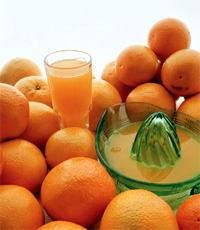
...because not all fruits and vegetables are equal
By David Broom, Medical herbalist
We know we should eat a Rainbow Diet. But we cannot calculate the actual amounts of pesticides, herbicides, toxic metals, industrial wastes and radioactive materials that have been released into our environment in the last 50 years.
Some experts have said that there could be as much as 4000 billion tons of chemicals since the Second World War.
(Updated from an article originally published in May-June 2004 icon)
One thing for certain is that they were not around when the human race evolved. It follows that we were not designed to cope with the complexity or the volume of potentially lethal substances and yet this chemical madness continues unchecked.
Surveys show that people working with pesticides are nine times more likely to suffer with cancer. Also, it has been discovered that most American nursing mothers have significant levels of DDT in their breast milk, especially if they are meat eaters.

People working with pesticides are nine times
more likely to suffer with cancer

The US Environmental Protection Agency found a relationship between pesticide exposure and birth defects.
The University of North Carolina found that children from homes that used sprays in the gardens were four times more like to contract certain types of cancer than those from homes that did not use chemical sprays. Children from homes using insecticides were found to be at increased risk of developing leukaemia - even more so if their mothers were exposed during the final months of pregnancy.
Dr Victor Penzer warns that family pets have been permanently blinded when exposed to pesticides at ground level.
For those with cancer and those who wish to prevent it there are numerous warning signals coming out of everyday research. Epidemiologists in Russia have known for many years that T-Cell counts and functions are suppressed after pesticide exposure.
As far back as the 1970s, young women in Israel were twice as likely to die from breast cancer as women in similar sociological conditions from other countries. Research showed that exposure to pesticides was the cause. Dairy products produced in Israel at the time contained high levels of DDT and Lindane. Tests on breast milk showed that Israeli women had many times greater levels of Lindane in their milk than American women.

Pets have been permanently blinded
when exposed to pesticides at ground level

The Israelis stopped using Lindane, and the death rate from breast cancer in young Israeli women fell by 34 per cent in the following years. Israel is the only nation that has experienced a decline in the death rate from breast cancer in pre-menopausal women.
Pesticides are now known to kill essential soil bacteria that we should be consuming for good health in our gut. For more on this ...
Go to: Heal your Gut - Heal your Body
Another disturbing factor is that over 80 per cent of pesticides applied in agriculture disperse through the air, soil and water without reaching their intended targets.
Recent reports from the Environmental Working Group in Washington help us to understand how to lower our pesticide exposure by 90 per cent by simply avoiding 12 of the most contaminated fruits and vegetables. The Working Group says that we are exposed to 20 pesticides per day from this group alone.

Nectarines, strawberries, apples and peaches were the worst of the fruits in the survey. They found up to nine pesticides in a single item.
The five fruits least likely to have pesticide residues on them are bananas, kiwi, pineapple, mango and papaya.
Bell peppers, spinach, potatoes and celery were found to be most contaminated in the vegetables group. Each of these was found to have up to 10 different pesticides on a single sample. Peppers have been implicated in this country when a government working party suggested that young children could experience a mild stomach upset by eating peppers that have been sprayed.
Onion, sweetcorn, avocado, broccoli, cauliflower, peas and asparagus were the least likely to have pesticides on them. Multiple pesticide residues are rare on these foods.
Although I advise all of my patients to "buy organic" whenever possible, if needing to budget, the following lists will prove helpful when you ’Eat a Rainbow’. Do buy the foods in the most contaminated group from a reliable organic source, preferably with the Soil Association seal of approval:
The 12 Most Contaminated Foods in the survey are:
Apples
Bell peppers
Celery
Cherries
Imported grapes
Nectarines
Peaches
Pears
Potatoes
Raspberries
Spinach
Strawberries
The 12 Least Contaminated Foods in the survey are:
Asparagus
Avocados
Bananas
Broccoli
Cauliflower
Sweet corn
Kiwi fruit
Mango
Onions
Papaya
Pineapples
Sweet peas
For more on this subject ...
Go to: The Rainbow Diet - and how it can help you beat cancer
David Broom

MIRCH - Registered Medical Herbalist
David Broom has practised as a medical herbalist and allergy tester for over 20 years. He incorporates many aspects of naturopathic medicine into his practice and has worked at some of the pioneering clinics in this field.
For 7 years he was Executive Director of a charity clinic in Bournemouth and now practices in Hampshire and Dorset.
More recently he is working on projects for growing organic herbs and vegetables and recommends the use of raw juices, herbs and sprouted seeds for the treatment and prevention of disease.
David lectures to many groups including students at the local university and local doctors. He and his wife Judy work together at their naturopathic clinic at Hurn Forest near Ringwood in Hants.